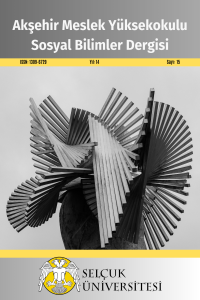Öz
Dünyada üretilen gıdaların yaklaşık üçte biri üretim ve tüketimin farklı süreçlerinde israf olmaktadır. Sadece israf olan bu miktarın bir kısmı ile dünyadaki açlık sorunları ortadan kaldırılabilir. Gıda israfı aynı zamanda bu malların üretimi için kullanılan kaynakların da zayi olduğu anlamına gelmektedir. Ekonomilerdeki israf sadece gıda ile sınırlı değildir. Değişik sektörlerde, üretim ve tüketimin her aşamasında atık ve israflar ortaya çıkabilmektedir. Son dönemlerde israfla ilgili çalışmaların sayısı artış göstermektedir. Ancak israf kavramı, iktisat teorisi içinde kendisine yer bulamamaktadır.
Çalışmanın konusu israf kavramının ekonomik açıdan analiz edilmesi, israf olgusunun neden ve sonuçlarının mevcut iktisat teorisi içinde ele alınması ve israfın teorik sonuçlarının incelenmesidir. İsraf kavramını bir iktisat terimi olarak ele almak amaçlanmıştır. Çalışmada, üretim-tüketim döngüsü içinde israfın izi sürülerek israf türleri sınıflandırılmıştır. Her bir israf türü için literatürdeki bazı çalışmaların sonuçlarına yer verilmiştir.
Anahtar Kelimeler
Kaynakça
- Abdullah, F. M. (2003), Lean Manufacturıng Tools And Techniques In The Process Industry With A Focus On Steel, Doctoral Dissertation, University of Pittsburgh
- Amicarelli, V., Bux, C., (2021), Food waste measurement toward a fair, healthy and environmental-friendly food system: A critical review, British Food Journal, 123(8), 2907-2935.
- Aschemann‐Witzel, J., Giménez, A., Grønhøj, A., Ares, G., (2020), Avoiding household food waste, one step at a time: The role of self‐efficacy, convenience orientation, and the good provider identity in distinct situational contexts, Journal of Consumer Affairs, 54(2), 581-606.
- Backhouse, R. E., Medema, S. G. (2009), Defining Economics: The Long Road to Acceptance of the Robbins Definition, Economica, 76, 805-820.
- Bretter, C., Unsworth, K. L., Russell, S. V., Quested, T. E., Doriza, A., & Kaptan, G., (2022), Don't put all your eggs in one basket: Testing an integrative model of household food waste, Resources, Conservation and Recycling, 185, 106442.
- Bulow, J., (1986), An Economic Theory of Planned Obsolescence, The Quarterly Journal of Economics, 101(4), 729-749
- Buzby, J. C., Hyman, J. (2012), Total and per capita value of food loss in the United States. Food policy, 37(5), 561-570.
- Çerçi, M., Tosun, N. Z., (2021), Planlı Eskitme Kavramı Bağlamında Tüketici Tutumları, Türkiye İletişim Araştırmaları Dergisi, (37), 1-19.
- Demirtaş, B., A Kaya, E. Dağıstan, (2018), Consumers’ Bread Consumption Habits and Waste Status: Hatay/Turkey Example, Turkish Journal of Agriculture-Food Science and Technology, 6(11), 1653-1661
- Dölekoğlu, C. Ö., (2017), Gıda Kayıpları, İsraf ve Toplumsal Çabalar, Tarım Ekonomisi Dergisi , 23 (2) , 179-186 . DOI: 10.24181/tarekoder.364946
- Eriksson, M., Strid, I., Hansson, P. A. (2012), Food losses in six Swedish retail stores: Wastage of fruit and vegetables in relation to quantities delivered. Resources, Conservation and Recycling, 68, 14-20.
- FAO, (2022), World Food and Agriculture – Statistical Yearbook 2022, Rome. https://doi.org/10.4060/cc2211en Erişim: 30.05.2023
- Farr‐Wharton, G., Foth, M., Choi, J. H. J., (2014), Identifying factors that promote consumer behaviours causing expired domestic food waste, Journal of Consumer Behaviour, 13(6), 393-402.
- Griffin, M., Sobal, J., Lyson, T. A., (2009), An analysis of a community food waste stream, Agriculture and Human Values, 26, 67-81.
- Gustavsson, J., Cedeberg, C., Sonesson, U., van Otterdijk, R. and Meybeck, A. (2011), Global Food Losses and Waste. Extent, Causes, Prevention, FAO, Rome.
- Hatırlı, S.A., Mikroekonomi, Ankara, Alter Yayıncılık, 2017
- Hermsdorf, D., Rombach, M., Bitsch, V., (2017), Food waste reduction practices in German food retail, British Food Journal.
- Kallbekken, S., Sælen, H., (2013), ‘Nudging’hotel guests to reduce food waste as a win–win environmental measure, Economics Letters, 119(3), 325-327.
- Katajajuuri, J. M., Silvennoinen, K., Hartikainen, H., Heikkilä, L., Reinikainen, A., (2014), Food waste in the Finnish food chain, Journal of cleaner production, 73, 322-329.
- Lipinski, B., Hanson, C., Lomax, J., Kitinoja, L., Waite, R., Searchinger, T. (2013), Reducing Food Loss and Waste, World Resources Institute Working Paper, June.
- Mallinson, L. J., Russell, J. M., Barker, M. E., (2016), Attitudes and behaviour towards convenience food and food waste in the United Kingdom, Appetite, 103, 17-28.
- Marangon, F., Tempesta, T., Troiano, S., Vecchiato, D., (2014), Food waste, consumer attitudes and behaviour. A study in the North-Eastern part of Italy, Italian Review of Agricultural Economics, 69(2-3), 201-209.
- Nayak, B., (2006), Lean manufacturing and value management convergence of divergent tools. SAVE International, 1-18.
- Nyborg, K. (2000), Homo economicus and homo politicus: interpretation and aggregation of environmental values, Journal of Economic Behavior & Organization, 42(3), 305-322.
- Ohno, Taiichi. Toyota Production System: Beyond Large-Scale Production. CRC Press, 1988.
- Packard, Vance, The Waste Makers, New York, David McKay Co, 1960.
- Parizeau, K., Von Massow, M., Martin, R., (2015), Household-level dynamics of food waste production and related beliefs, attitudes, and behaviours in Guelph, Ontario, Waste management, 35, 207-217.
- Priefer, C., Jörissen, J., Bräutigam, K. R., (2013), Technology options for feeding 10 billion people. Options for Cutting Food Waste. Science and Technology Options Assessment, European Parliament, Brussels, Belgium. Robbins, Lionel. An Essay on the Nature & Significance of Economic Science, London, Macmillan and Co., Limited St. Martins Street, 1945
- Sakaguchi, L., Pak, N., & Potts, M. D., (2018), Tackling the issue of food waste in restaurants: Options for measurement method, reduction and behavioral change, Journal of Cleaner Production, 180, 430-436.
- Stancu, V., Haugaard, P., Lähteenmäki, L., (2016), Determinants of consumer food waste behaviour: Two routes to food waste, Appetite, 96, 7-17.
- Swami, V., Chamorro-Premuzic, T., Snelgar, R., Furnham, A., (2011), Personality, individual differences, and demographic antecedents of self-reported household waste management behaviours, Journal of Environmental Psychology, 31(1), 21-26.
- TİCARET BAKANLIĞI, (2018), Türkiye İsraf Raporu, Tüketicinin Korunması ve Piyasa Gözetimi Genel Müdürlüğü, Ankara
- UNITED NATIONS ENVIRONMENT PROGRAMME (2021), Food Waste Index Report 2021, Nairobi.
- URL-1: TDK - Güncel Türkçe Sözlük https://sozluk.gov.tr/ Erişim: 01.06.2023
- URL-2: https://www.etimolojiturkce.com/kelime/israf Erişim:01.06.2023
- URL-3: http://lugatim.com/s/iktisat Erişim: 01.06.2023
- URL-4: https://www.etymonline.com/word/waste#etymonline_v_24374 Erişim:01.06.2023
- URL-5: https://dictionary.cambridge.org/tr/s%C3%B6zl%C3%BCk/ingilizce-t%C3%BCrk%C3%A7e/waste Erişim:01.06.2023
Ayrıntılar
| Birincil Dil | Türkçe |
|---|---|
| Konular | Uygulamalı Ekonomi (Diğer) |
| Bölüm | Araştırma Makaleleri |
| Yazarlar | |
| Yayımlanma Tarihi | 30 Haziran 2023 |
| Yayımlandığı Sayı | Yıl 2023 Sayı: 15 |

